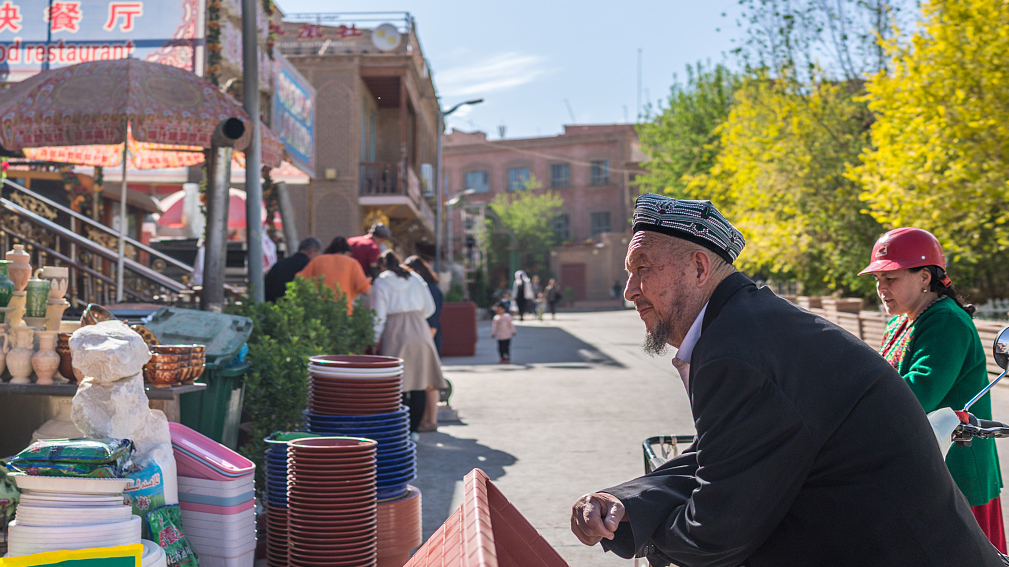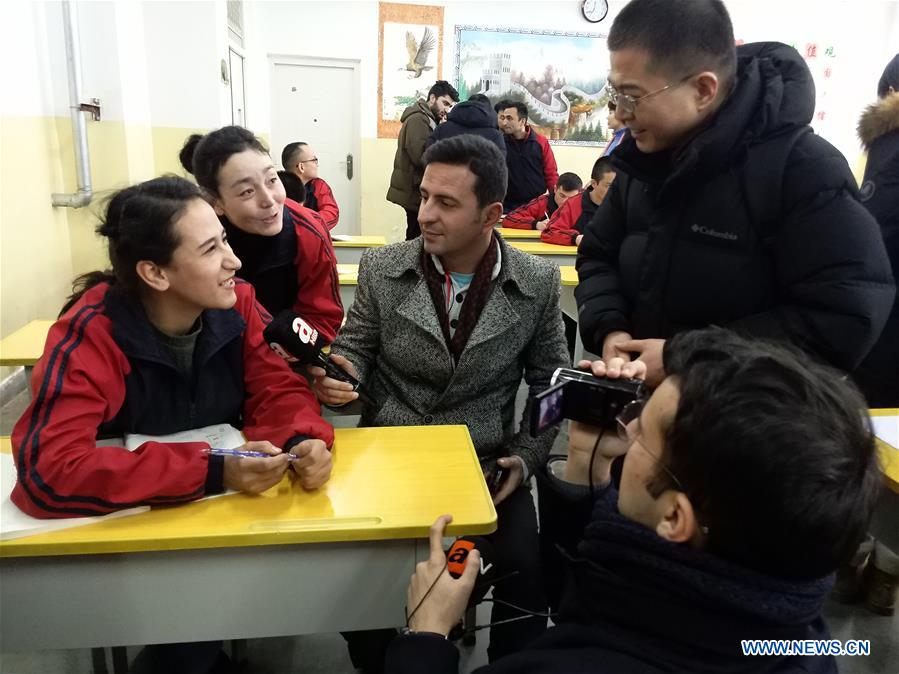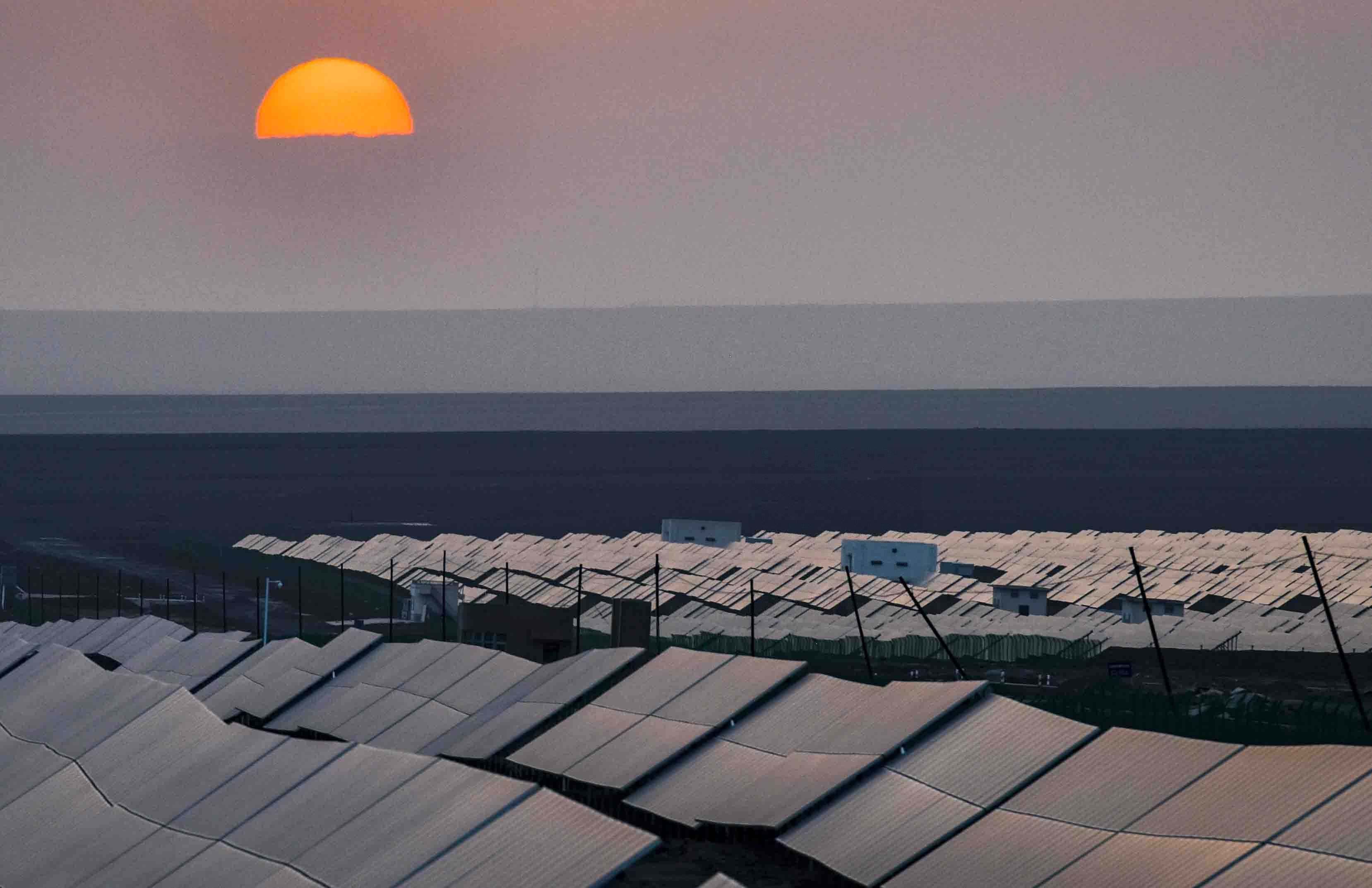
A resident asks about the price of goods in Kashgar, northwest China's Xinjiang Uygur Autonomous Region, April 12, 2019. /VCG Photo
A resident asks about the price of goods in Kashgar, northwest China's Xinjiang Uygur Autonomous Region, April 12, 2019. /VCG Photo
Editor's note: Keith Lamb is a University of Oxford graduate with a MSc degree in Contemporary Chinese studies. His primary research interests are international relations of China and China's "Socialism with Chinese Characteristics." The article reflects the author's opinions, and not necessarily the views of CGTN.
The Chinese Foreign Ministry criticized the New York Times on November 18 for disregarding the current situation of China's Xinjiang Uygur Autonomous Region by publishing what the New York Times claim are internal pages that "expose" China's "crackdown" in Xinjiang.
The article goes on to criticize China's Xinjiang policy for attempting to wipe out the Uygur nationality and religious freedom through the use of detention camps. Beijing counters that these centers are deemed necessary in combating terrorism, and that there has not been a single violent terrorist case occurring in Xinjiang for 35 consecutive months now.
The New York Times report follows on the heels of increasing U.S. interference into China's internal affairs. For example, on September 11, the U.S. senate passed a bill which condemns "gross human rights violations of ethnic Turkic Muslims in Xinjiang." The bill cites that there are over 1 million Muslim ethnic minorities in internment camps.
Beijing disputes the high figure and says these centers are attended voluntarily. Their purpose is to de-radicalize and teach useful employment skills.
The date of this bill, September 11, couldn't be any more ironic. On September 11, 2001, the Twin Towers fell in suspicious circumstances at free-fall speed due to what was claimed to be an attack on the U.S. by the Islamic terrorist group al Qaeda.

Foreign journalists interview trainees at Kashgar vocational education and training center in Kashgar, northwest China's Xinjiang Uygur Autonomous Region, January 13, 2019. /Xinhua Photo
Foreign journalists interview trainees at Kashgar vocational education and training center in Kashgar, northwest China's Xinjiang Uygur Autonomous Region, January 13, 2019. /Xinhua Photo
This act, supposedly committed by Osama bin Laden, triggered the U.S. war on terrorism. It was used as a pretext for both the invasion of Afghanistan and Iraq.
There was no thought given to the human rights of the millions of innocent Muslims and thousands of Western servicemen and women that were slaughtered in the process.
Guantanamo Bay and various other staging centers in foreign countries where the human rights standards set by the West could be ignored were used for torture. It was a step deemed appropriate by the George W. Bush administration when confronted with the terrorist threat.
The irony of ironies is that al Qaeda's Osama bin Laden was initially a U.S. puppet and for that matter, so was Saddam Hussein. Saddam Hussein, with the aid of U.S. backing, attacked Iran. He also gassed the Muslim Kurds who the U.S. has abandoned today.
Perhaps one of the biggest surprises about Osama bin Laden is the public revelation coming from former British Labour Member of Parliament George Galloway. He has stated that he heard of the name Osama bin Laden long before his name rose to public infamy. Galloway claims that sources inside the British Houses of Parliament told him that bin Laden was originally to be used to ferment trouble in China's Western region.
Whatever the case may be, there is no getting away from the fact that Western neo-colonial invasions of Iraq and Afghanistan have been a calamity to the Middle East and Central Asia. War with the death, destruction, and chaos that it brought is the ultimate denial of human rights.

A photovoltaic power plant in Turpan, northwest China's Xinjiang Uygur Autonomous Region, September 18, 2018. /Xinhua Photo
A photovoltaic power plant in Turpan, northwest China's Xinjiang Uygur Autonomous Region, September 18, 2018. /Xinhua Photo
Before both the Afghanistan and Iraq invasion, Western liberal democracies plied their populaces with dubious information and facts that were purposely twisted. The invasion of Iraq was justified through bogus claims about Hussein's involvement in 911. Then the narrative went on to explain the invasion of a sovereign state as necessary for "saving the people" through implementing a "just" liberal democracy.
And yet, the invasion was stationed from Saudi Arabia, a state whose human rights record, judged by Western standards, falls far behind Iraq and was lost in the fog of reporting.
And here we are today, the New York Times in league with its political masters are doing a 180 reverse and redirecting their efforts to destabilize China.
Despite the U.S. and its Western allies committing the most heinous abuses against Muslims, they seem to still think they are in a position to pontificate China's efforts to maintain order and fight radicalization.
China faces a near-impossible situation in Xinjiang. It is bordered by Afghanistan, still the home of radical Islamic terrorists and occupied by U.S. forces, both of which have sought to destabilize and break the unity of China.
The sad fact is that what happens in Xinjiang is simply not reported by the Western press with any regard to the reality of geopolitical and historical foundations. And why would they? If you're going to commit atrocities like killing millions of Muslims in Iraq for the purpose of extracting oil or funding terrorist groups used to destabilize competitors and justify invasion, then it's best to keep the population ignorant and keep up the façade that it's all about universal human rights that need no historical context.
(If you want to contribute and have specific expertise, please contact us at opinions@cgtn.com.)